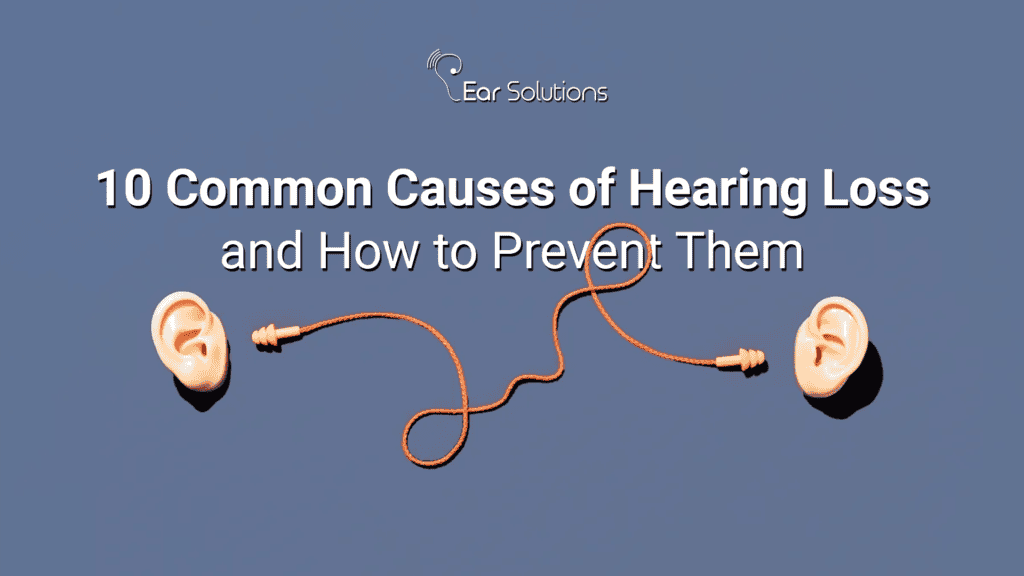Hearing loss can lead to an unhealthy lifestyle. The person dealing with hearing loss can be isolated from the society. Thankfully, advancements in the hearing care industry have helped hearing loss patients a lot. But before knowing about the treatment options of this problem you must understand what can be the reasons behind this so that it can be resolved easily.
While some causes of hearing loss are unavoidable, many can be prevented with the right knowledge and proactive measures. This blog explores 10 common causes of hearing loss and offers practical advice on how to prevent them.
1. Exposure to Loud Noises
Cause:
Repeated or prolonged exposure to loud noises is a leading cause of hearing loss. This can include exposure to loud music, heavy machinery, gunfire, and even everyday noises like traffic and household appliances.
Prevention:
Use Ear Protection: Wear earplugs or noise-cancelling earmuffs in noisy environments.
Limit Exposure: Reduce the amount of time spent in noisy environments. Take regular breaks to give your ears a rest.
Volume Control: Keep the volume of music and television at a safe level, especially when using headphones.
2. Aging (Presbycusis)
Cause:
Age-related hearing loss, known as presbycusis, is a natural part of the ageing process. It typically affects both ears and progresses gradually over time.
Prevention:
Regular Check-ups: Have regular hearing assessments, especially as you age.
Healthy Lifestyle: Maintain a healthy lifestyle, including a balanced diet, regular exercise, and avoiding smoking, to support overall ear health.
Hearing Aids: Use hearing aids if recommended by an audiologist to maintain quality of life.
3. Ear Infections
Cause:
Chronic ear infections can lead to hearing loss by causing damage to the structures of the middle ear.
Prevention:
Hygiene: Practice good ear hygiene and avoid inserting objects into the ear.
Medical Attention: Seek prompt treatment for ear infections to prevent complications.
Vaccination: Ensure children are vaccinated against diseases that can cause ear infections, such as pneumococcal disease and influenza.
4. Genetics
Cause:
Hearing loss can be hereditary. Genetic factors can predispose individuals to various types of hearing loss, including congenital and progressive hearing loss.
Prevention:
Early Screening: Newborn hearing screening
can detect hearing loss early, allowing for timely intervention.
Genetic Counseling: Families with a history of hearing loss should consider genetic counselling to understand their risks
and options.
5. Ototoxic Medications
Cause:
Certain medications can damage the inner ear, leading to hearing loss. These include some antibiotics, chemotherapy drugs, and high doses of aspirin.
Prevention:
Consult:Healthcare Providers: Discuss the potential side effects of medications with your healthcare provider.
Regular Monitoring: If taking ototoxic medications, have regular hearing tests to monitor any changes in hearing.
Regular Monitoring: If taking ototoxic medications, have regular hearing tests to monitor any changes in hearing.
6. Noise-Induced Hearing Loss
Cause:
Sudden, intense noise, such as an explosion or gunshot, can cause immediate and permanent hearing loss.
Prevention:
Hearing Protection: Use earplugs or earmuffs when exposed to sudden loud noises.
Safe Practices: Follow safety guidelines when using firearms or operating heavy machinery.
Public Awareness: Advocate for noise regulations and raise awareness about the dangers of sudden loud noises.
7. Earwax Blockage
Cause:
Excessive earwax (cerumen) can build up and block the ear canal, leading to temporary hearing loss.
Prevention:
Avoid Cotton Swabs: Do not insert cotton swabs or other objects into the ear canal.
Professional Cleaning: Have your ears cleaned by a healthcare professional if you experience excessive earwax buildup.
Ear Drops: Use over-the-counter ear drops to soften earwax, making it easier to remove.
8. Head Trauma
Cause:
Head injuries can damage the structures of the ear, leading to hearing loss. This can result from accidents, sports injuries, or physical assaults.
Prevention:
Wear Helmets: Use helmets when riding bicycles, or motorcycles, or participating in contact sports.
Safety Measures: Follow safety protocols at work and in recreational activities to prevent head injuries.
Immediate Care: Seek immediate medical attention if you sustain a head injury, even if symptoms are not immediately apparent.
9. Illnesses and Diseases
Cause:
Certain illnesses and diseases, such as meningitis, mumps, and measles, can cause hearing loss.
Prevention:
Vaccination: Ensure you and your children are vaccinated against diseases that can cause hearing loss.
Healthy Lifestyle: Maintain a strong immune system through a healthy lifestyle to reduce the risk of infections.
Early Treatment: Seek prompt medical treatment for illnesses that could potentially affect your hearing.
10. Environmental Factors
Cause:
Environmental factors, such as pollution and exposure to toxins, can contribute to hearing loss.
Prevention:
Limit Exposure: Reduce exposure to environmental toxins, such as lead and mercury, which can impact hearing health.
Use Protective Equipment: Wear protective gear if working in environments with harmful substances.
Advocate for Clean Air: Support and advocate for policies aimed at reducing environmental pollution.
Conclusion:
Hearing loss can significantly impact quality of life, but many of its causes are preventable. By understanding the common causes and taking proactive measures, you can protect your hearing health and maintain better hearing for longer. Regular hearing check-ups, using protective equipment, maintaining a healthy lifestyle, and being aware of the risks associated with certain medications and environments are crucial steps in preventing hearing loss. If you suspect any changes in your hearing, seek advice from a healthcare professional to address the issue promptly and effectively.





